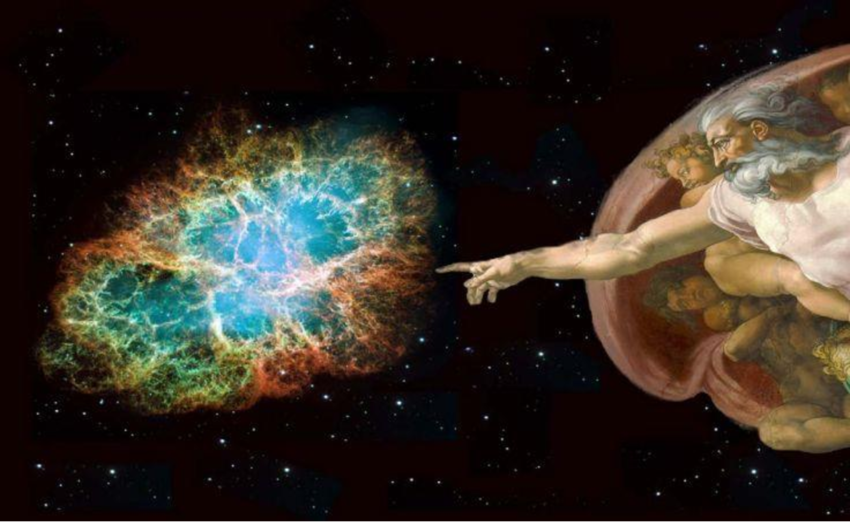The Creation story can be divided into two parts. The first three days details the creation of the Cosmos. The last three days details the creation of the earth’s residents—vegetable and animal. Not surprisingly (and not contradictory), there are two creation stories that complement each other. Genesis 1 presents a detailed daily description of the whole process whereas Genesis 2 is more about the sixth day.
A good way to understand this literary device is to consider the oral tradition through which the story might have been first offered. It is evening. The storyteller and listeners sit by the evening campfire. Bellies are full of food. People are ready to either be entertained or to go to sleep. The raconteur would first capture the attention of his listeners with a grand, dramatic extravagant proclamation that excited their souls and minds and comforted their weary, anxious souls.
Later on, he would move into the details to educate them about the purposes of God versus the plans of humanity. The overall effect was a captivating story that informed them of three great ideas: God is the sole creator to whom they own their existence, humans are not the center of the universe and have a secondary role to God, and that man and woman were there to take care of each other in the beginning of history and still need each other in the present.
Sometimes readers forget that the people in the Bible are really just that—human beings with similar needs and wants universal to all cultures and people. In fact, the name, Adam, means “earth-creature,” which surely all humanity can identify with, personally. Formed from the earth, he was given the job of naming the animals. Some people claim that he was the first zookeeper, but he was more like the first biologist, categorizing what he saw around him. More importantly, the scripture says that he was created in God’s image—an amazingly significant reason why people all over the world since time immemorial have sought after and connected with God. Moreover, according to the Bible, humans are naturally drawn to Him from whom they came and without Him, they are incomplete.
Along that same line, Adam grew lonely being the only human on earth and so God created a helper for him—because Adam needed assistance—from his own rib (or side). Some have suggested subservience for Eve as she was created after Adam, but if that is true then the plants would be superior to Adam as they were created first and, according to Scripture, he dominated over the natural world. The Hebrew term for helper in fact is the same term used to describe the Spirit of God in the Old Testament so this was not a master-slave relationship although God did let Adam name her, “Eve”—and the two paradoxically were separate and one flesh at the same time. This first male-female relationship before the Fall must have been truly refreshing and, no doubt, God was pleased at the union of souls and hearts in His two children.
Unfortunately for all humanity, not being perfect as their maker, Adam and Eve eventually succumbed to their human passions of power and control and ruined their perfect paradise by doing the one thing forbidden by God (and for good reason)—eating from the fruit of the tree of knowledge of good and evil. God warned them that they would die if they partook of its offerings. This was not a fuzzy notion although one could speculate that they did not understand what death was at this point in human existence. Still, God said, “No,” and that should have been sufficient.
It is easy to point fingers at Eve and say that she is ultimately to blame for the Fall, but Scripture is clear when it states that she was deceived through the craftiness of the serpent who said, “You will not certainly die” (v. 3:4). The deceived is not the evil one—it is the deceiver who is punished. Furthermore, Adam was not misled; he volitionally chose to follow Eve in her illicit action. As Ramé wrote, “I do not wish to be a coward like the father of mankind, and throw the blame upon a woman, but it is certain that the old answer is often still the true one, ‘The woman tempted me.’ I am not wholly innocent; I played with fire, and was surprised, like an idiot, when it burnt me.”
Ultimately, all three are to blame for this mess. All three rebelled against God’s will, all three wanted to be like God, and all three would suffer immediate and eternal consequences. The serpent becomes the lowest form of life, the woman will endure painful childbearing and domination by men, and Adam will have to work the land, and they both will eventually die. They wanted to be their own god, so God will allow them to reap the benefits of a human “deity,” which is no deity at all as they would soon discover.
Despite this sorrowful new condition, God’s consequences carry with them reward, too. If Eve brought death into this world through the fruit, she now brings life back to the world through childbearing. If Adam lost the paradise of Eden, he can do his best to bring it back through toiling, weeding, and cultivation. Even in failure, God makes a way for goodness and hope to exist.
(Copyright by John S. Knox, 2025)

